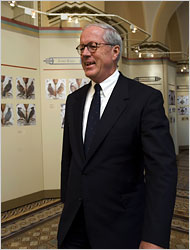In his 4th quarter Public Justice Report, James Skillen suggests that regardless of who wins what seats in the upcoming election little will probably change in Washington. First, he suggest voter apathy is high because “most voters seem to be aware that lobbyists have more power than they do, and that their vote won’t matter much. Many have also concluded that major problems won’t be solved by Washington, regardless of who wins election.”
Our current system is ill-equipped to solve the continuing stagnation in Washington politics, and Skillen believes that even the emergence of independents and third parties can do little to change the current atmosphere.
The problem? He suggests that our country desperately needs a system that represents the national interests because we are a nationwide community of citizens whose collective actions can have dramatic impact upon our culture and our world. Unfortunately, the system we have (and even independent and 3rd party groups) will not represent national interests but special interests groups. He proposes a focusing on building national parties:
What we need is something much more significant than election-campaign finance reform, or lobbying reform, or the growth of independent voters and representatives. We need a fundamental change in the electoral system that will help to produce national parties that are truly competitive and whose elected representatives will be answerable to party members and voters rather than to lobbyists. We need a system change that will lead to the representation of the real diversity of American voters in Congress and that will, thereby, draw voters out of their apathy into participation in elections and politics. We need 75 percent or more of voters to vote instead of 50 percent or less.
He continues with a proposal to change the way we elect representatives from focusing on districts to electing parties:
If each state eliminated all congressional districts and allowed any number of political parties (not only two) each to field a number of statewide candidates corresponding to the number of House seats to which the state is entitled, voters could then caste their votes for the party they really believed in. No votes would be lost as happens in a simple majority system. When the votes were tallied, each party would gain as many House seats as its percentage of the statewide vote entitled it, no more, no less. If the Republicans got 40 percent of the vote, they would win 40 percent of the seats. If the Democrats got 40 percent of the votes, they would win 40 percent of the seats. If the Libertarian Party, or Green Party, or Conservative Party won five percent of the vote, it would win five percent of the seats. If a Public Justice Party won 10 percent of the votes, it would win 10 percent of the seats.
Not only would such a system allow the diversity of American voters some real choices for a change, it would also compel parties in different states that share common principles and platforms to work together to build a national party. If all Republicans, or all Greens, or all Libertarians across the country did not bind themselves in a tight agreement about what they would aim to achieve when their elected representatives arrived in Washington, they would have no coalition of forces in Congress. This process would begin to force the emergence of truly national parties with national agendas. These parties would also have to decide ahead of time (and make public) which interest groups were supporting them and on what terms they would take those interest groups into account in their legislating. Voters would then be able to decide which party to support and would be able to help shape an overarching agenda for the party whose elected representatives would remain more accountable to its members and voters than to the interest groups.
Skillen believes this solution would do away with gerrymandering and hold officials to a greater level of accountability to national interests.
I still have to process Skillen’s proposal, but I am interested in the way he tackles the problems in Washington by suggesting it is a systems problem not simply a personnel problem. If anything, this could open a conversation about different ways to think about our current system; although I think most people would fear any tampering or changes to our current system.
